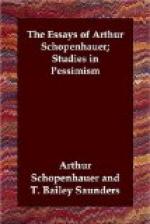THE VANITY OF EXISTENCE.
This vanity finds expression in the whole way in which things exist; in the infinite nature of Time and Space, as opposed to the finite nature of the individual in both; in the ever-passing present moment as the only mode of actual existence; in the interdependence and relativity of all things; in continual Becoming without ever Being; in constant wishing and never being satisfied; in the long battle which forms the history of life, where every effort is checked by difficulties, and stopped until they are overcome. Time is that in which all things pass away; it is merely the form under which the will to live—the thing-in-itself and therefore imperishable—has revealed to it that its efforts are in vain; it is that agent by which at every moment all things in our hands become as nothing, and lose any real value they possess.
That which has been exists no more; it exists as little as that which has never been. But of everything that exists you must say, in the next moment, that it has been. Hence something of great importance now past is inferior to something of little importance now present, in that the latter is a reality, and related to the former as something to nothing.
A man finds himself, to his great astonishment, suddenly existing, after thousands and thousands of years of non-existence: he lives for a little while; and then, again, comes an equally long period when he must exist no more. The heart rebels against this, and feels that it cannot be true. The crudest intellect cannot speculate on such a subject without having a presentiment that Time is something ideal in its nature. This ideality of Time and Space is the key to every true system of metaphysics; because it provides for quite another order of things than is to be met with in the domain of nature. This is why Kant is so great.
Of every event in our life we can say only for one moment that it is; for ever after, that it was. Every evening we are poorer by a day. It might, perhaps, make us mad to see how rapidly our short span of time ebbs away; if it were not that in the furthest depths of our being we are secretly conscious of our share in the exhaustible spring of eternity, so that we can always hope to find life in it again.
Consideration of the kind, touched on above, might, indeed, lead us to embrace the belief that the greatest wisdom is to make the enjoyment of the present the supreme object of life; because that is the only reality, all else being merely the play of thought. On the other hand, such a course might just as well be called the greatest folly: for that which in the next moment exists no more, and vanishes utterly, like a dream, can never be worth a serious effort.




